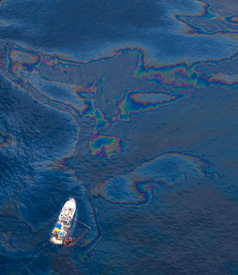
Co-authored with Dr. Norma Bowe and originally published on Truthout.org.
Science and the news media sometimes occupy different worlds. Journalists rely on scientists for the latest findings, but can be drawn to controversy and provocation because it increases readership, sometimes looking for disparities to make a point. Scientists want nothing of it; their conclusions are guided by data. If a mistake is made or data are misinterpreted, any inconsistent findings are ultimately eliminated by the self-correcting nature of science.
As reported in today's Atlanta Journal Constitution, earlier reports of oil-eating bacteria cleaning up the Gulf were off base. As I wrote earlier in Truthout, these strains of bacteria may well have the appetite to consume crude oil, but they do not have the stomach! {When I wrote this last October, I presented it as a possibility; today's reports sadly show that it is true. The important question now: What is the best way to deal with the residual pollution? What are the best technologies available, and are we ready to deploy them to avoid generations of degradation of the rich diversity of species offered by our oceans?}
From the Atlanta Journal Constitution, February 20, 2011:
At a science conference in Washington, marine scientist Samantha Joye of the University of Georgia aired early results of her December submarine dives around the BP spill site. She went to places she had visited in the summer and expected the oil and residue from oil-munching microbes would be gone by then. It wasn't.
From my News Analysis in Truthout from October 2010:
A lead editorial in The New York Times published September 2010 is an example of such a culture clash. Many count on The New York Times for their careful reporting and thoughtful opinion pieces. Unfortunately, the "Science and the Gulf" editorial about the BP oil spill got it wrong, describing a supposedly "famous now-you-see-it, now-you-don't oil plume controversy" that is, in fact, not a controversy. The editors claim that scientists "said the plume had been pretty much been devoured by oil-eating microbes and largely disappeared." This misrepresents their study profoundly.
Consider the facts. In the study referred to in the editorial, scientists at the Lawrence Berkeley National Laboratory took 17 deepwater (1,100 to 1,200 meters) samples at various locations across the Gulf of Mexico from two ships between May 25 and June 2. They detected an oil plume up to ten km from the wellhead in which there was a slight decrease in oxygen -- expected if microbes are consuming the oil. They also observed increased biomass in the plume compared to outside the plume, indicating that the microbes' growth could be stimulated by the oil.
Using DNA technology, the scientists confirmed particular strains of microbes that are capable of consuming oil. Interestingly, out of 4,000-5,000 functional genes detected, some 1,652 genes are known to serve a specific oil-degrading function.
The Lawrence Berkeley National Laboratory study published in Science and discussed in a news analysis in Nature verifies the existence of the large oil plume as previously reported; documents an array of specific microbes capable of degrading oil that are stimulated by the oil plume, along with detection of oil degradation products; and proposes a model for degradation rates (not measured) that show promise for bioremediation. All of us have hope that microbes in the ocean could someday speed the recovery of the Gulf by consuming the massive quantities of spilled oil.
In no way does this study document or indicate that the microbes "devoured" the oil plume and that it has "largely disappeared" -- the microbes may well have the appetite, but may or may not have the stomach (capacity) to consume it!
The New York Times' "Science and the Gulf" editorial calls for "impartial investigation that steps back from the politics of the moment" and concludes, "we should base our hopes not on conjecture but on painstaking science." For readers who rely on these editorials for a fresh, thoughtful perspective on the latest news, better communication is needed across the cultural divide between reporters and those making the latest scientific discoveries to avoid misunderstanding and accurately report that "painstaking science."
Have you seen the latest blob off the Florida coast?
http://digitalcuttlefish.blogspot.com/2011/02/toxic-blob-alert.html
Um, what? Both the article and the Nature review plainly claims that there is no evidence either way.
"Lab scientist Terry Hazen said his research differs from Joye's because they looked at different places at different times." [Atlanta]
""We really don't know how much of the oil is being degraded," says Valentine." [Nature]
So instead of warning us to take the previous mistake on board, you are instead asking us to repeat it? Argh, no - I'll stick to the verified science, please.
Exactly! That's the point; unfortunately, the Times editorial got it wrong, leading to misinformation.
Regarding:
"So instead of warning us to take the previous mistake on board, you are instead asking us to repeat it?"
You've misread the article. I am emphasizing that the microbes simply cannot handle the capacity as shown by the persistence of the oil and by products. We need to reassess how we use the latest technologies.
"Careful reporting"?
Like when they regurgitated the Bush Administration's Iraq WMD BS without question?
Like when they sat on the warrantless wiretapping story for a whole year, by their own admission to avoid hurting Bush's re-election bid?
Like when they treated O'Keefe's ACORN frame-up as credible, then declined to report on its thorough debunking in court?
What are the two conflicting viewpoints expressed in this article?